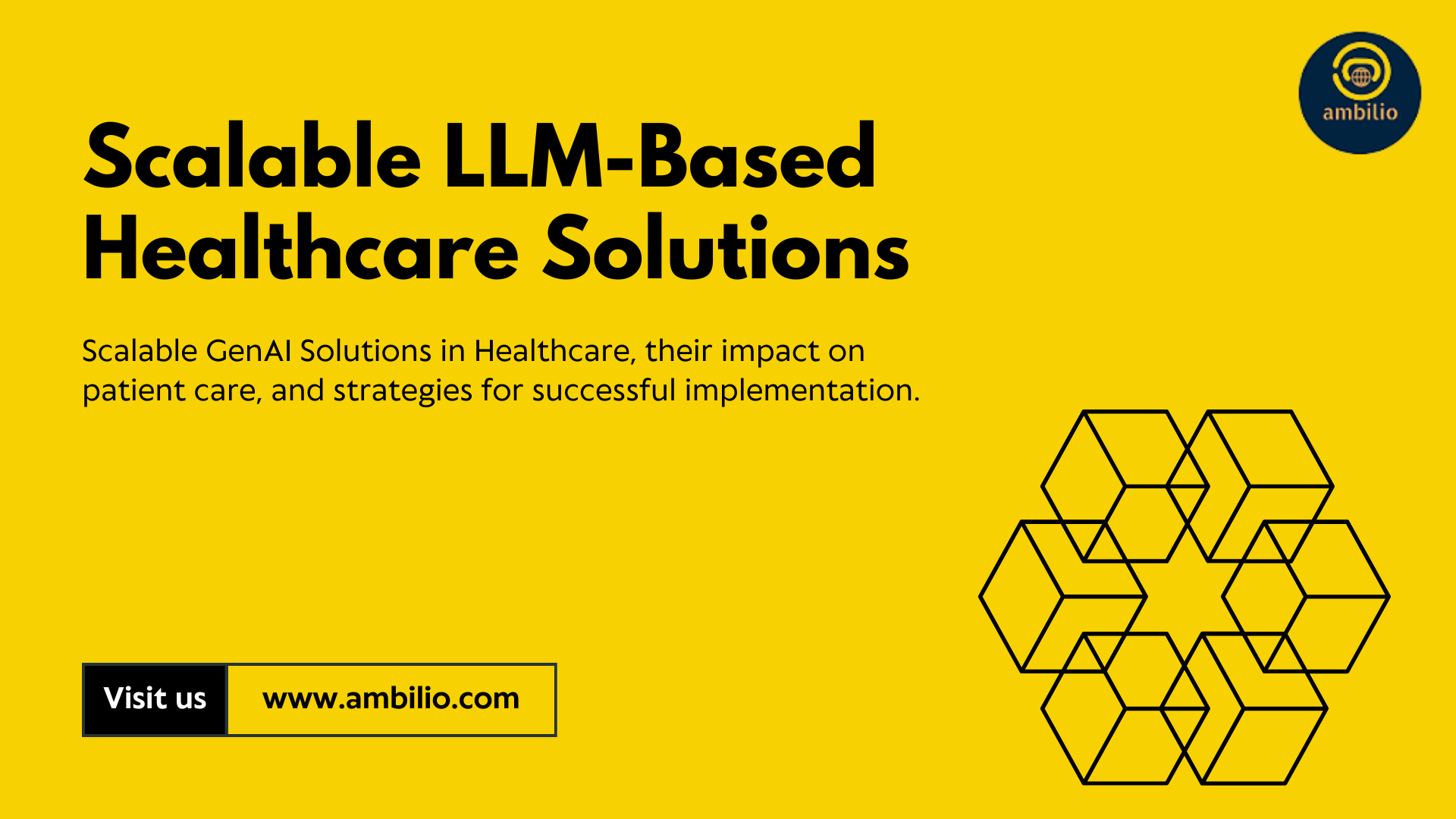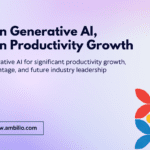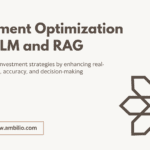The healthcare industry is rapidly embracing artificial intelligence (AI) technologies, with large language models (LLMs) at the forefront. LLMs, capable of understanding and generating human-like text, are poised to revolutionize various aspects of healthcare, including patient care, clinical workflows, and medical research. However, building scalable LLM-based healthcare solutions involves navigating a complex landscape of challenges. This article explores the potential of LLMs in healthcare, the key challenges to scalability, and strategies to overcome these hurdles.
The Potential of LLMs in Healthcare
Clinical Decision Support
LLMs can be a game-changer in clinical decision support. By analyzing extensive medical literature, clinical guidelines, and patient data, LLMs can provide real-time recommendations to healthcare professionals. This aids in diagnosis and treatment planning, ensuring that medical decisions are based on the most current evidence.
Medical Documentation
The administrative workload on healthcare providers is a significant issue. LLMs can help automate the creation and summarization of medical records, reducing the time clinicians spend on paperwork. This not only enhances efficiency but also improves the accuracy and consistency of patient records.
Patient Education and Engagement
LLMs have the potential to enhance patient education and engagement by generating personalized health information and answering patient queries. This can lead to improved health literacy, empowering patients to take a more active role in their healthcare management, ultimately leading to better outcomes.
Medical Research
In the realm of medical research, LLMs can accelerate progress by assisting in literature reviews, hypothesis generation, and data analysis. They can help researchers identify new treatment options and provide insights into complex medical conditions.
Predictive Analytics
LLMs can also contribute to predictive analytics in healthcare. By analyzing patterns in large datasets, LLMs can help predict disease outbreaks, patient outcomes, and resource allocation needs, enabling proactive and informed decision-making.
Challenges in Building Scalable LLM-based Healthcare Solutions
While the potential of LLMs in healthcare is vast, building scalable solutions involves overcoming several critical challenges.
Data Privacy and Security
Healthcare data is highly sensitive, and protecting patient information is paramount. Regulations like the Health Insurance Portability and Accountability Act (HIPAA) in the United States impose strict standards for data privacy and security. Ensuring compliance with these regulations while developing and deploying LLM-based solutions is essential to avoid data breaches and maintain patient trust.
Regulatory Compliance
In addition to data privacy, healthcare AI solutions must comply with various regulatory requirements, which can differ by region and application. Navigating this complex regulatory landscape is challenging but necessary to ensure that LLM-based solutions are safe and effective.
Model Interpretability
Healthcare professionals must understand how AI systems arrive at their conclusions, especially in clinical settings where decisions directly impact patient care. The “black box” nature of many LLMs poses challenges for adoption, as healthcare providers require transparency and interpretability in AI-generated recommendations.
Domain Specificity
General-purpose LLMs may lack the specialized knowledge required for healthcare applications. Training or fine-tuning these models on domain-specific medical data is crucial to ensure their relevance and accuracy in healthcare contexts.
Integration with Existing Systems
Healthcare organizations often rely on legacy IT systems, which can make integrating new LLM-based solutions complex. Ensuring seamless integration with electronic health records (EHR) systems and other healthcare IT infrastructure is essential for the effective deployment of LLMs.
Scalability and Performance
As healthcare organizations increasingly adopt LLM-based solutions, these systems must scale to handle growing volumes of data and user requests. Ensuring that these solutions maintain performance under load is critical for their success.
Bias and Fairness
LLMs can inadvertently perpetuate or amplify biases present in their training data, leading to disparities in healthcare delivery. Addressing these biases is crucial to ensure that LLM-based solutions provide equitable care to all patients.
Strategies for Building Scalable LLM-based Healthcare Solutions
To overcome these challenges and build scalable LLM-based healthcare solutions, organizations can employ several strategies:
Privacy-Preserving Techniques
Implementing techniques like federated learning, differential privacy, and secure multi-party computation allows LLMs to be trained on sensitive healthcare data without compromising patient privacy. These approaches ensure that data remains secure while enabling the development of robust AI models.
Regulatory-First Approach
Designing AI solutions with regulatory compliance in mind from the outset can simplify the development process. Incorporating features such as audit trails, access controls, and data governance mechanisms ensures that LLM-based solutions meet regulatory requirements.
Explainable AI
Developing methods to make LLM decisions more interpretable is crucial for building trust among healthcare professionals. Techniques like attention visualization or rule extraction can help demystify the decision-making process of LLMs, making them more acceptable in clinical settings.
Domain Adaptation
Fine-tuning general-purpose LLMs on high-quality, domain-specific medical datasets improves their performance in healthcare applications. This step ensures that the models are tailored to the specific needs of healthcare professionals and patients.
Modular Architecture
Designing scalable, modular architectures allows LLM-based solutions to be easily integrated with existing healthcare IT systems. Modular designs enable flexibility and adaptability, making it easier to deploy these solutions across various healthcare settings.
Cloud-Native Solutions
Leveraging cloud computing platforms ensures the scalability, high availability, and performance of LLM-based healthcare applications. Cloud-native solutions can dynamically scale to meet demand, providing robust support for large-scale deployments.
Bias Mitigation
Rigorous testing and debiasing techniques are essential for identifying and mitigating biases in LLM outputs. By addressing these issues, healthcare organizations can ensure that their AI systems deliver fair and equitable care.
Continuous Learning and Validation
Establishing processes for continuous model updates and validation ensures that LLMs remain current with the latest medical knowledge and best practices. Ongoing learning helps maintain the relevance and accuracy of AI-driven healthcare solutions.
The Future of LLMs in Healthcare
As LLM technology continues to evolve, its applications in healthcare will become more sophisticated. Future developments may include multimodal LLMs that can process and generate text, images, and other data types simultaneously, enabling more comprehensive healthcare analysis. We may also see the rise of LLM-powered virtual health assistants that provide personalized health coaching, mental health support, and chronic disease management.
Conclusion
Building scalable LLM-based solutions for healthcare holds tremendous promise for improving patient outcomes, enhancing clinical efficiency, and advancing medical research. By addressing the unique challenges of the healthcare domain and implementing thoughtful strategies, organizations can harness the power of LLMs to transform healthcare delivery. As we continue to innovate in this space, it is essential to prioritize patient safety, privacy, and ethical considerations while pushing the boundaries of what AI can achieve in healthcare.



